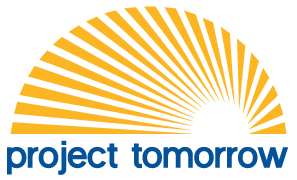Project Tomorrow can support your district in applying for the Michigan 99b Grant

Welcome to our webpage dedicated to partnering with Michigan K-12 districts for the competitive 99b Grant.
Project Tomorrow has been providing schools with a comprehensive computational thinking toolkit and instructional strategies for the past five school years. These resources are aimed at assisting teachers in incorporating computational thinking concepts, practices, and principles into all content areas, including computer science.
Section 99b Grant Applications are Now Open!
We are excited to learn that the Section 99b Teacher Professional Development Programs for Computer Science, Computational Thinking Courses Grant is now open for applications for the 2025-2026 school year! The Project Tomorrow offerings are detailed in the documents below.
To learn more about partnering with Project Tomorrow, please contact our Michigan Computational Thinking Project Manager, Katie Marchionna (kmarchionna@tomorrow.org)!
Project Tomorrow Services for 2025 Applicants
- NEW Grant Applicants
- Current Project Tomorrow Partner Districts (2024-2025 Awardees)
Project Tomorrow has a proven history of high-quality professional learning services and informative data collection. We believe in the personalization of professional learning experiences for teachers, and our supports extend far beyond our workshop day. More information and resources about our philosophy and approach are included in this white paper and accompanying presentation:
- Personalizing Elementary Teacher Professional Learning on Computational Thinking Integration Based Upon Understanding Teacher Readiness, by Dr. Julie A. Evans
Project Tomorrow Professional Learning Courses for Educators and Coaches on Computational Thinking

Introduction to Computational Thinking for Educators: A one-day, 6-hour interactive course that equips K-12 educators with foundational knowledge of CT concepts and actionable plans for integrating them into a specific curricular area.
Foundations of Computational Thinking Integration: A two-part course sequence (two-days, 6-hours each) emphasizing practical strategies for integrating CT into classroom curriculum, leveraging digital tools, and enhancing student problem-solving and self-direction.
Strategies for Coaching Educators on Computational Thinking Integration: A one-day course for instructional coaches focused on sustainable CT practices, personalized coaching plans, and fostering a school-wide culture of CT integration.
EdCamp for Computational Thinking: A 4-hour collaborative event for educators to share and showcase CT-infused lessons and units, tailored to district or regional needs.
Project Tomorrow Extended Support: Access to a suite of resources including an online community, monthly newsletters, and webinars for continued professional development in CT integration.
Project Tomorrow Navigator Strategic Planning Process: A two-part facilitation process to align district CT goals, identify implementation models, and customize professional development to district-specific needs.
Project Tomorrow Teacher Readiness Assessment and Evaluation Tools for Computational Thinking and Computer Science
Project Tomorrow offers an array of researched-based tools for the assessment of student and teacher readiness and skills with Computational Thinking and Computer Science. Please visit our Computational Thinking Resources page to learn more about these tools.
The assessment tools can be used to customize teacher professional learning as well as comply with the reporting requirements of the grant. Below are samples of the reports that are provided to partner districts based on their pre- and post- assessment data:
Project Tomorrow Student Skills Inventory and Self-Efficacy Tools for Computational Thinking
Student Computational Thinking Skills Inventory: An assessment tool that evaluates students’ ability to apply computational thinking strategies to solve grade-level problems, offering proficiency levels for core CT concepts and adaptable use as a pre- or post-assessment.
Student Self-Efficacy Survey: A summative evaluation tool that captures students’ perceptions of their problem-solving abilities and the impact of CT learning on their perseverance and competency, offering research-based insights into CT’s long-term effects in K-8 education.

2024-2025 Project Tomorrow Computational Thinking Integration Project Workshops
Participation:
- 17 districts (over 200 educators) participated in professional learning through a series of full-day Computational Thinking workshops, along with ongoing support through monthly webinars, office hours, and an online community.
- 13 of these districts have fully implemented Project Tomorrow’s CT Integration Professional Learning programs.
- 4 districts have customized the program to fit their needs, engaging in select aspects of the professional learning support.


Participant Testimonials:
- I like how the information meets us at our individual levels and doesn’t assume that everyone is in the same place.
- I feel excited and ready to begin implementing CT not just in my classes but across the district
- The presentation and flow was wonderful. I would recommend this training to others.
- I am so pleased with the progression of learning. I wasn’t sure I would ever feel comfortable with this, but I trusted in the process.
- This was great! One of the best trainings I’ve been to in years! (And I’m sent to a lot of trainings…)



Elizabeth Macklin
Hastings Area School District, MichiganIf you have any difficulty accessing a document, please let us know by messaging kmarchionna@tomorrow.org.

